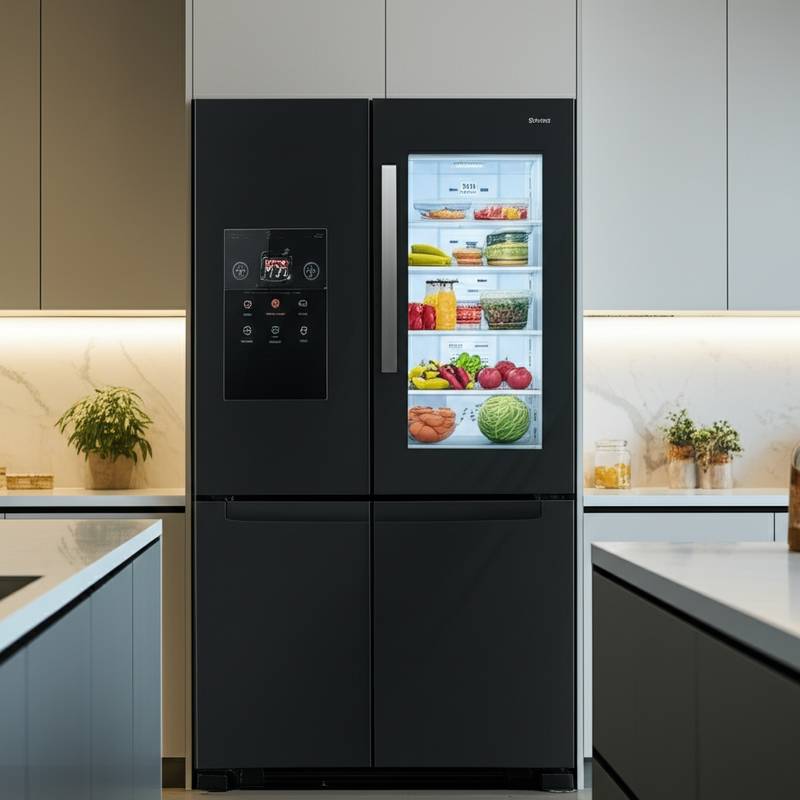How Smart Fridges Use AI to Track Expiry Dates and Reduce Food Waste
Smart homes advance rapidly, and the kitchen emerges as a key area of innovation. The refrigerator evolves from a basic cooling unit into a connected system that supports better eating habits, financial savings, and waste reduction. Advanced smart fridges employ artificial intelligence to observe contents, monitor expiration dates, and propose recipes to use items before they spoil. This development goes beyond mere convenience. It aligns with the demand for residences that assist in efficient and sustainable living.
The Challenge of Household Food Waste
Households discard a significant volume of food each year. Individuals frequently overlook stored items, overestimate portion sizes, or ignore expiration labels. Such waste drains finances and burdens the environment. Conventional refrigerators merely preserve food without maintaining any inventory. Consequently, users face uncertainty each time they access the interior.
Intelligent Fridges That Anticipate Needs
Contemporary smart fridges address these issues through computer vision and machine learning. Internal cameras and sensors detect placed items, while software scans barcodes or labels to log products and their shelf lives. The system monitors expiration dates in real time. As an item approaches its limit, the fridge delivers notifications via a mobile device or its own display.
Certain models extend functionality by suggesting meals from soon-to-expire ingredients. For instance, detection of nearing-expiry spinach and eggs prompts recommendations for an omelet or a smoothie. Users prevent spoilage and ease meal organization with these features.
Benefits for Daily Household Routines
Smart fridges deliver convenience and cost reductions for typical families. Users avoid rummaging through cluttered spaces or uncovering overlooked remnants. A maintained digital inventory enables automatic shopping lists, prevents duplicate purchases, and supports efficient meal planning. This integration lowers grocery expenses and eliminates the annoyance of discarding spoiled goods.
Environmental advantages prove substantial as well. Less food waste translates to reduced demands on production, transportation, and disposal resources. Smart fridges thus contribute to a sustainability initiative that links technology with conscientious use.
Innovations in Smart Fridge Technology
Leading brands drive these advancements. Samsung Family Hub models feature interior cameras for remote content viewing via a mobile application. LG ThinQ units identify items and link with kitchen devices to facilitate meal coordination. Bosch and Haier systems incorporate digital assistants for voice-activated control.
Beyond expiration tracking, these fridges connect to online grocery services for restocking alerts when stocks dwindle. Integration with cooking applications simplifies dinner routines. Although the technology continues to develop, its focus remains on straightforward, interconnected, and eco-friendly food management.
Addressing Adoption Challenges
Consumers often pause before purchasing advanced appliances due to cost. Smart fridges command higher prices than standard models. Concerns also arise regarding data security and device compatibility. Buyers seek guarantees that personal routines and shopping details stay protected.
Manufacturers respond with enhanced encryption, clear privacy guidelines, and improved device harmony. Standards such as Matter promote seamless communication among smart appliances. As affordability increases and connections refine, uptake should grow consistently.
Enhancing Kitchen Management
Consider accessing your fridge to view an instant overview of contents, freshness levels, and cooking options. Such insight reshapes meal planning and shopping. The fridge serves as a reliable partner in food organization, nutritional tracking, and stress reduction for cooking tasks.
Parents gain from alerts on snacks or dairy items to avoid waste. Professionals depend on prompts to utilize ingredients promptly. Cooking enthusiasts find inspiration in suggestions drawn from available supplies.
Integration into Intelligent Home Systems
Smart fridges form one element in the expansion of adaptive residences. Similar intelligence applies to dishwashers that conserve water or ovens that tailor cooking based on recipes. The kitchen develops into an interconnected network where appliances collaborate for optimal efficiency and ease.
This evolution extends past technological novelty. It fosters a transition to deliberate consumption and harmonious routines. Automation of tasks like procurement and planning frees time for family, health, and inventive pursuits.
Steps to Implement Waste-Reduction Features
To adopt these benefits, evaluate your current fridge setup first. Select models with robust AI cameras and app integration for seamless use. Begin by scanning items manually if needed to build the inventory accurately.
Pair the fridge with voice assistants for hands-free operation during busy routines. Review notifications weekly to adjust habits, such as batch cooking from expiring items. Track savings over months to measure impact on budget and waste levels.
Achieving Sustainable Kitchen Efficiency
Fridges that curb waste once appeared as science fiction. Today, they represent a practical upgrade for contemporary households. Successive models enhance precision, linkages, and interfaces. They adapt to user patterns, provide valuable data, and blend into everyday activities.
Those considering kitchen enhancements should explore these options. The devices offer more than ease; they advance genuine ecological progress. Through smart design and utility, smart fridges demonstrate how innovations subtly improve existence, promote cleanliness, and encourage reflection.
